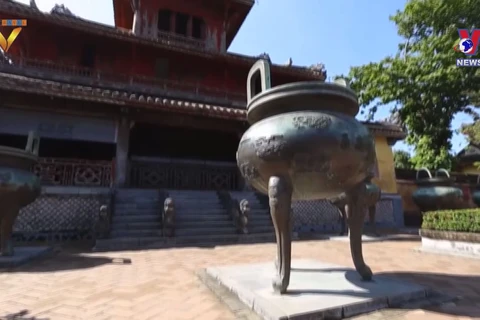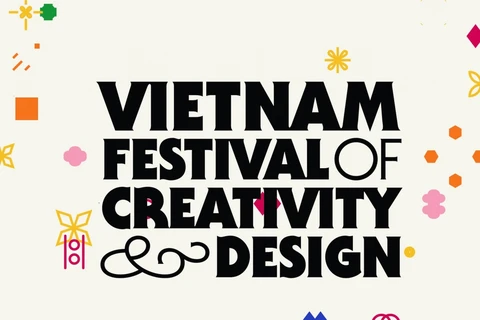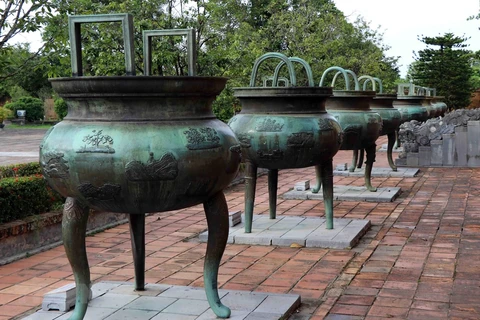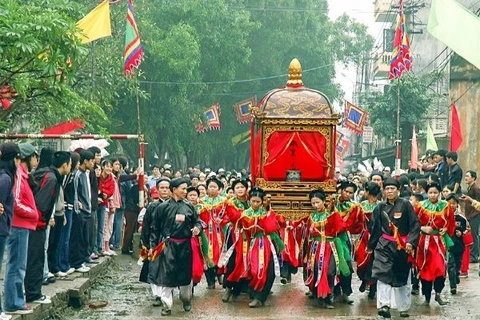Hanoi (VNA) - Since joining UNESCO in July 1976, Vietnam has continued to play a greater role, and has been a very active member of the Executive Board of different committees, said Michael Croft, UNESCO Chief Representative in Vietnam.
“To give a general assessment of Vietnam towards the United Nations, the easiest thing to say is it's certainly very positive,” Croft said in an exclusive interview with the Vietnam News Agency on the occasion of 45 years of Vietnam joining the UN Educational, Scientific and Cultural Organisation (UNESCO).
The country has also been active, particularly in the culture sector in terms of supporting some of the new resolutions and new conventions, especially the convention on promoting the diversity of the cultural expression, he added.
Vietnam demonstrates to other member states how to leverage UNESCO’s designations, he said, adding “we have seen in terms of the success of the country in using the World Heritage Sites, the Geoparks, and also the World Biosphere Reserves as engines for development.”
“As we'd like to say UNESCO’s placing culture as the heart of development. So in terms of the role of the organisation, it’s a very vibrant member, and it’s a member that punches above its own weight.”
He highlighted that Vietnam's first candidacy to head a UN organisation was with UNESCO in 2017, and emphasised this shows the importance that Vietnam places on UNESCO and the way it sees its role within the organisation.
Regarding the cooperation relationship between UNESCO and Vietnam over the year, Croft said it has evolved as the UN's relationship with Vietnam has evolved.
According to him, it was development assistance in the previous years, and this is shifting, as Vietnam starts to transform.
Vietnam is now a middle income country, has a lot of different resources, and has always been very capable of making strategic decisions, he said, adding that “what it expects from UNESCO and from the rest of the UN is for us to be used on mandates creatively in support of those priorities.”
UNESCO’s moving away from projects towards supporting partnerships for sustainable development in Vietnam. So UNESCO's role now in Vietnam is less about doing development projects and more about working with the government, with society, with academia, and with the private sector to build the “coalition” of the concerns around important issues in education, culture, science, communication and information.
On UNESCO’s recommendations to the Vietnamese Government to promote the image of Vietnam to the world, Croft said he is impressed by cultural diplomacy in Vietnam, especially the work and the approaches of President Ho Chi Minh, who was able to apply cultural diplomacy. “With such great effect during the struggle for freedom of independence, cultural diplomacy is as important now in the 21st century as it was before,” he said.
According to him, Vietnam has such a unique cultural heritage and it also retains culture, and there are a lot of cultural assets that it can use to continue to build up its soft power.
The cultural industries in Vietnam have great untapped potential because there's a lot of things that are still undiscovered here and that people are still very interested about. This is really an advantage of Vietnam in promoting social and economic development.
He highlighted Hanoi’s initiative, almost two years ago, to apply to UNESCO and to be granted the title of Hanoi Creative City is really wonderful.
This is an opportunity for Vietnam to rebrand itself and recreate itself in the 21st century - “a country of peace, a country where it's good to visit and calm but also a country of creativity, a country of dynamism, a young country, an up and coming country, an engaged country.”/.
“To give a general assessment of Vietnam towards the United Nations, the easiest thing to say is it's certainly very positive,” Croft said in an exclusive interview with the Vietnam News Agency on the occasion of 45 years of Vietnam joining the UN Educational, Scientific and Cultural Organisation (UNESCO).
The country has also been active, particularly in the culture sector in terms of supporting some of the new resolutions and new conventions, especially the convention on promoting the diversity of the cultural expression, he added.
Vietnam demonstrates to other member states how to leverage UNESCO’s designations, he said, adding “we have seen in terms of the success of the country in using the World Heritage Sites, the Geoparks, and also the World Biosphere Reserves as engines for development.”
“As we'd like to say UNESCO’s placing culture as the heart of development. So in terms of the role of the organisation, it’s a very vibrant member, and it’s a member that punches above its own weight.”
He highlighted that Vietnam's first candidacy to head a UN organisation was with UNESCO in 2017, and emphasised this shows the importance that Vietnam places on UNESCO and the way it sees its role within the organisation.
Regarding the cooperation relationship between UNESCO and Vietnam over the year, Croft said it has evolved as the UN's relationship with Vietnam has evolved.
According to him, it was development assistance in the previous years, and this is shifting, as Vietnam starts to transform.
Vietnam is now a middle income country, has a lot of different resources, and has always been very capable of making strategic decisions, he said, adding that “what it expects from UNESCO and from the rest of the UN is for us to be used on mandates creatively in support of those priorities.”
UNESCO’s moving away from projects towards supporting partnerships for sustainable development in Vietnam. So UNESCO's role now in Vietnam is less about doing development projects and more about working with the government, with society, with academia, and with the private sector to build the “coalition” of the concerns around important issues in education, culture, science, communication and information.
On UNESCO’s recommendations to the Vietnamese Government to promote the image of Vietnam to the world, Croft said he is impressed by cultural diplomacy in Vietnam, especially the work and the approaches of President Ho Chi Minh, who was able to apply cultural diplomacy. “With such great effect during the struggle for freedom of independence, cultural diplomacy is as important now in the 21st century as it was before,” he said.
According to him, Vietnam has such a unique cultural heritage and it also retains culture, and there are a lot of cultural assets that it can use to continue to build up its soft power.
The cultural industries in Vietnam have great untapped potential because there's a lot of things that are still undiscovered here and that people are still very interested about. This is really an advantage of Vietnam in promoting social and economic development.
He highlighted Hanoi’s initiative, almost two years ago, to apply to UNESCO and to be granted the title of Hanoi Creative City is really wonderful.
This is an opportunity for Vietnam to rebrand itself and recreate itself in the 21st century - “a country of peace, a country where it's good to visit and calm but also a country of creativity, a country of dynamism, a young country, an up and coming country, an engaged country.”/.
VNA

























